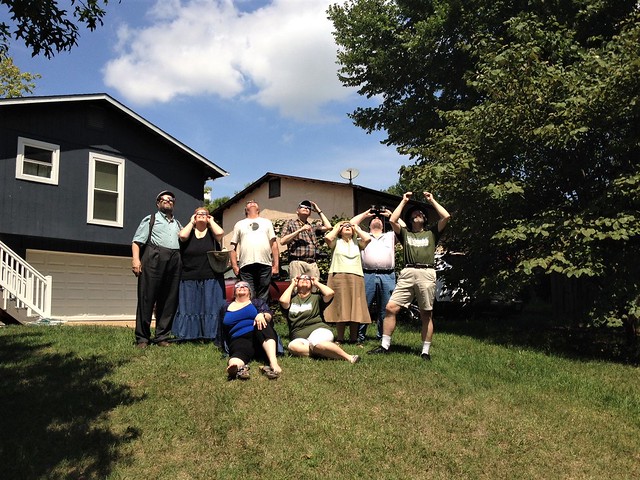
And we awoke and found us here on the dark hill's side
One of my friends of most venerable standing is not only the leading expert on Tolkien's use of astronomy in his fiction, but he also lives in the exurbs south of St. Louis, right in the middle of the path of totality of Monday's eclipse. What are the odds? Did he move there, 30-odd years ago, to prepare for this day?
Regardless, he and frau were well-prepared for a small invasion of assorted friends from long-off and far away for a backyard eclipse party. We dined on hamburgers and bratwurst, and spent our extra time watching old movies of King Solomon's Mines (in which an eclipse plays a key cameo role) and listening to dreadful BBC radio dramatizations of Tolkien's love life ("Ron, hold me!"). The topography cooperated, as the backyard tops a hillside which faces south, the ideal direction. The heavens also cooperated: while it rained on the day we arrived and again upon leaving, it was clear for the days in between, with only a few wisps of cloud around at the eclipsical moment. The projections of pinholes over the skylights kept viewers informed of progress if they ducked inside for air-conditioned relief from the heat.
I've seen an annular eclipse before, so I knew all about the bite being taken out of the sun, the eerie dimmed lighting, the crescent-shaped shadows of the spaces between the leaves. But I hadn't seen totality, and that's what I was eager to experience.
It was different from what I expected. The sky did not go dark; it was still blue with visible clouds and no stars. What did happen as the moon obscured the sun was that the sun's corona popped out. Bright but not painfully so to the naked eye (and quite blocked out by eclipse glasses), this huge splotch around the utterly black disc provided enough light to prevent night but not enough to allow day. The effect was more like that of the kind of twilight that emerges when the sun sets prematurely behind a mountain - as indeed it had.
The speed, however, with which the moon snuffed out the last bits of the sun's disc was much greater than the earth's at sunset, and that's what provided the greatest eeriness. At that moment, the ambient light around us abruptly became much darker over the course of just 3 or 4 seconds, and reversed just as abruptly at the end. It was like ... what was it like?
A fenris-wolf or other mythological monster eating up the sun?
No.
A sign from the heavens that the End Times are nigh?
No.
A dimmer switch. That was it. A giant, celestial dimmer switch.

No comments:
Post a Comment